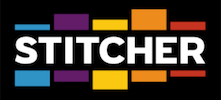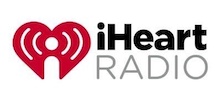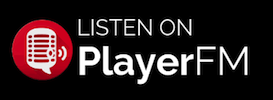
Why Podcasts are the Best Promo for Authors (and How to Get on Them)
Good news: going on podcasts is the best way to promote your book. Podcast listeners are eager to learn and read books.
Even more good news: Podcast hosts love to book authors.
So there has to be a catch, right?
Well, here it is: most of us are pitched daily, in the worst ways.
Listen to this episode to find out the absolute best way to pitch yourself to the podcasts you want to be on...and then how to slay once you're on there.
This is another of the episodes based on the book I'm writing.
As promised, here's the "Can't lose" podcast pitch template:
Hi TK:
I’ve listened to a lot of podcasts, but I’m honestly blown away by yours. TK REASON WHY. I made sure to include what I like about your show in a review on iTunes (see attached!)
I know your show covers TK INFO ABOUT WHAT SHOW ADDRESSES, and I’d like to audaciously pitch myself as a guest.
PARAGRAPH ABOUT YOU AND WHY YOU’D MAKE A GREAT GUEST.
I also very much relate to what you’ve shared about TK THING THEY’VE SHARED ABOUT AND WHY YOU RELATE.
I loved your conversations with TK PREVIOUS INTERVIEWS WITH PEOPLE THAT ARE SIMILAR TO YOU.
Here are some potential interview ideas:
- 5 IDEAS IN BULLET POINTS
Other interesting things about me:
PARAGRAPH THAT ENCOMPASSES SOME QUIRKY THINGS ABOUT YOU
[ONLY INCLUDE THIS IF YOU’VE BEEN ON SHOWS THAT ARE SIMILAR TO THIS ONE]: I’ve appeared as a guest on dozens of shows. Here are a few examples that might be relevant for your audience:
TK EXAMPLES WITH LINKS
Let me know if you and your team think I could be a good fit for the show or want to chat further. Either way, thank you for the great show.
Respectfully,
TK
APPLY FOR A CALL TO WORK WITH LEGACY LAUNCH PAD HERE
TRANSCRIPT:
Anna here, welcome to the podcast that doesn't want you to have to keep keep clicking refresh, to find out your how your book is selling because you don't care how your book is selling because you are too busy living the fabulous life that your book has given you.
This is a solo episode, based on information that's in my book On Good Authority coming to you April 23 of 2023. And this is all about how promoting yourself and your book on podcasts, which is the absolute best thing to do provided you do it right and this episode is all about how to do it right.
Chris Voss Best Selling Author of Never Split the Difference credits podcast for the tremendous success of his book he said he he hired Ryan Holiday legendary book marketer and author and Ryan got him on Lewis Howes' podcast and he said it just hit hard. From there. He went to Dax Shepard's podcast, he was on James Altucher's podcast, and the book has sold millions upon millions of copies and really came out of nowhere.
Now, great news, podcasters love to book authors. authors have a lot to say, we know they're probably not going to, you know, be at a loss for words, even though some are introverts. So that's great news. John Corcoran, who I had on the podcast said, "I find authors much easier to say yes to because, you know, they're going to be good at answering questions, and they have great authority."
The bad news is we are pitched authors all the time, I receive, at least I would say four terrible pitches a day. And the problem is, if you go and hire somebody who says, I'm gonna get you on podcasts, and they kind of subscribe to the spray and pray method, which is that they just pitch over 1000s of people, and maybe they're gonna get two yeses. We now there are a few agencies where I just have such a negative association with those people in my inbox that if they were pitching someone great, I would know they were great, because I'd be like, Oh, my God, these people. They pitch me people who are not authors. Now, this is a podcast about authors, and they don't know the name of the show. And that's not entirely their fault, because I changed the name all the time, but maybe try to know the name when you're pitching. Um, so you are far better off pitching yourself.
So how do you know who to pitch yourself to and how to do it? So go to I would say the biggest podcast in your genre in your field and be realistic. If you know it's a huge podcast, they're probably don't even accept guests. If you want to kind of drill down to a more realistic podcast, go to the iTunes page or whatever podcast app you're on. And go down to the bottom where it says listeners who liked this also liked and kind of just keep going down and down and down until you get to ones that you think are really realistic. It has guests, obviously, make sure the podcast is still active. It has at least 100 episodes they've released at least in the last few weeks. And write a kick ass pitch letter.
I'm pasting below a template for a kick ass pitch letter and a copy of the worst pitch I've ever received. And and so step number one, review the podcast review on iTunes. It's the secret to every podcaster's heart. When you pitch with a super awesome pitch letter mentioned just casually I love your show so much. It's what I said in this attached review, attach a screenshot of the review and think about it. What can you this is not about you in your book. This is about how can you serve this podcaster's audience. You're going to be better the better the more familiar you are with the show, the better you're going to be at pitching yourself because you're going to see what the podcasters needs are.
But I think you know it is so much better to pitch yourself to a show that has your target audience that In a show with a million downloads, Alex Sanfilippo, who is a podcaster, who has numerous podcasting companies, including pod match, which actually matches podcasters, with podcast guests said, "So many people say, Oh, they only want to be on shows that have 100,000 downloads. Because they think of it like social media, they think, oh, it's like 50 likes, that doesn't mean that much. Well, if 50 people are gonna sit in a room and listen to you for half hour, would you do that suddenly, having 50 listeners doesn't sound like so few."
So there are obviously millions of shows out there. So you don't want to, you don't want to waste your time on the wrong ones. And you don't want to waste your time on ones that are out of reach. So think about it, how do you narrow it down? Well, think about your avatar. Think about your reader, think about who you want to hear the information from your book, when you're looking at podcasts, when you're listening to them, does this speak to that avatar, so you can sign up for pod match Alex's website, and that is just literally like a dating site for podcasters and podcast hosts. But I also recommend pitching yourself.
And with John Corcoran, who's podcaster and the co founder of Rise 25 said is you want to make yourself relevant to the podcaster. So if they have a narrow focus, you want to cater that to that. And the example he gave is "I know you feature only woodworking experts on your show. But I've noticed you haven't had anyone on who talks about the financial aspects of how woodworking businesses need to operate. And I just wrote a book that's the definitive guide on how to manage your finances for a woodworking business." So that's a very specific, excellent example.
So if you don't hear back, which a lot of the time you don't, I just, you know, for my new book, I decided I wanted to try to do some outreach like this. And so what I did is I went and I looked at podcasts that people who had written books like mine had been on, and I listen to them. And then I used a little hat GPT. And I went in, I asked for summaries, and I asked for other examples of episodes like that. And then I reached out to the podcaster, I reviewed, I attached a screenshot of the review. And I explained what it is I could talk about that I thought would be relevant to their listeners. Now. We, my team helped me we sent out about 10, I got two responses, which I didn't think was terrible. I will say one of those two was, Wow, this is an amazing pitch. It's so fantastic.
What I did want to those two responses, and you don't have to spend money, this is just literally just what I did. There's candy company called SugarWish where you can send someone $20 worth of candy. And it's a perfect small thank you when you don't have someone's mailing address, but you have their email address, and to just say thank you so much as it's so sweet of you to agree to book me. I can't wait to do it. Again. You don't have to do that.
John Corcoran said, assume if you don't hear back, the person didn't get your message message across various platforms. Now, yesterday, when I tried recording this episode, the three other times I was hearing myself say these words, and I realized I got to sort of drink my own Kool Aid. And so the eight people that we had not heard back from I went onto LinkedIn, and I messaged them. And you know, I tried different strategies. I'll have to let you know if that worked. Because I haven't been on LinkedIn today to see if it worked.
Listen to the podcasts ahead of time. To not listen to a podcast before you get on is to literally it's like showing up at a stranger's house and going like, Hey, will you introduce me to all your friends that you've worked, you know, five years to cultivate? I had a guy on my podcast recently whose team had pitched him very aggressively. And it was very clear when he logged on not only that he had no idea what I did, but he didn't care. And he was very excited to explain publishing to me despite it not being his business. And it's just like it just reminded me Don't ever do that.
So know the host and if you don't know the host fake like you know the host or like you care. What Robert Greene said when I had him on the podcast is to be a great podcast guest you have to be authentic and relaxed and willing to tell stories with some self deprecating humor. He said nothing is worse than an egotistical writer who kind of shows how wonderful they are and how great their book is; they're so eager to promote it, that they come off as if they have no sense of humor. And that definitely describes the person I'm talking about.
And what's something that Alex Sanfilippo said when I interviewed him, which always stuck with me is, the best way to promote your book is to not promote your book. He said, "If an author says, Well, I'm not going to tell you about chapter five, because you have to grab the book to learn about that, nobody's interested."
They're listening to podcasts, because they trust you. And, you know, oftentimes, so podcast listeners, as you all know, are highly educated, passionate people who want to learn. And a lot of times the reason that they're listening, I don't know about you, when I find a new podcast, I look at previous episodes. And either it's the guest I'm interested in, or the topic they are talking about, which means I want to learn about that topic, which means that an author who's being interviewed about that topic is somebody I am ripe to find out about and become a fan of.
So the best way to show up, once you get booked is be a great guest: match the host's energy, when it's over, share the episode and tag the host. I've had guests do incredible things. I've received handwritten notes, I've received gifts, and you don't need to do any of that.
But do keep in mind that most podcasters are not being paid and are introducing you to their audience. So show respect for that. And finally, and I touched on this a little bit earlier, but don't worry about the number of listeners, Robert Greene said, he'll go on a podcast that has 5000 listeners. Because if you take those people who have 5000 listeners and you do 20 of them, and you do them, well, that's gonna spread books, unlike a lot of things.
Now, why do you read a book? Okay, I'm talking to myself. So I'm going to ask the question and answer the question. And the answer to the question is we read books because somebody we trust told us to, a friend recommended it, or a publication we read recommended...having the author on a podcast is the podcast host recommending it.
The reason a small show can make a move the needle more than a bigger show for the author is that massive shows grow because it's like cult of personality. The listeners can block out the guests, they might learn something, but they're not going to follow the guest. And Alex Sanfilippo said, "I've been on a few different million plus downloads shows and they've done less for me than some shows with under 100 listeners."
















